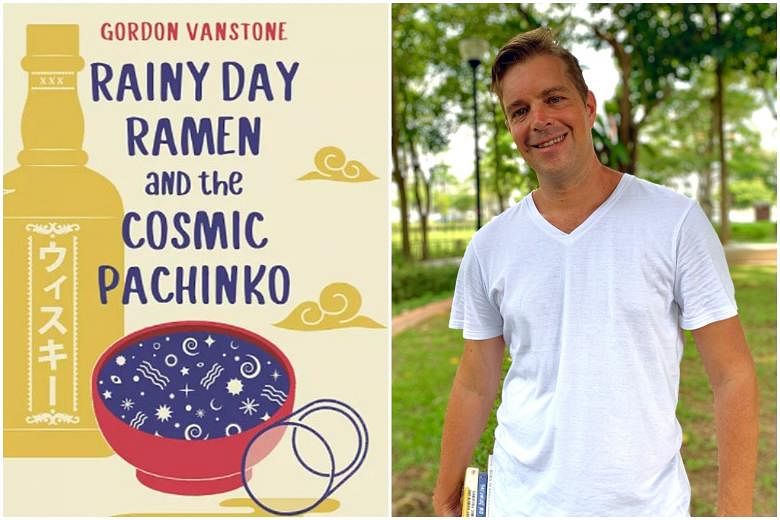FICTION
RAINY DAY RAMEN AND THE COSMIC PACHINKO
By Gordon Vanstone
Dollarbird/Paperback/384 pages/ $21.96/Books Kinokuniya
3/5
This quixotic tale set in Japan is artfully crafted, its final chapters in particular hurtling towards an end that has the potential to knock the wind out of readers' sails.
As its two-part title hints, Rainy Day Ramen And The Cosmic Pachinko is about tension, primarily within the not very likeable protagonist.
The Singapore-based Canadian author's debut follows Fred Buchanan, a "gaijin" (Japanese for foreigner) and unemployed day-drinker, as he teeters across Japan in search of his destiny.
He is driven by that niggling feeling of having not yet arrived and of listlessness and frustration at not having all, or any, of the answers.
Along his meandering path appears a patchwork cast of memorable oddballs.
A manga-reading woman's back tattoos bear resemblance to Fred's dreams. An old, homeless Japanese man, fluent in English, turns out to be a former anti-America protester whose former comrades now run an "emo fascist" bar.
There is also the mysterious kite flier in Tokyo's red-light district, whose incongruity with his surroundings and devotion to his task suggest there could be more to him that meets the eye.
Are they connected by the red thread of fate, an image which Fred grasps tightly? Or are they simply part of the cosmic pachinko, an arcade game known for its randomness and unpredictability?
Where can Fred find his rainy day ramen, which, in a stunted declaration of love to a female character, he describes as "making me feel warm inside... contented"?
The novel may remind readers of the debauchery of Jack Kerouac's On The Road (1957) and the more cynical coming-of-age stories associated with J.D. Salinger's The Catcher In The Rye (1951), which Vanstone references.
It is in this latter reference, however, that the book falls short. Fred muses that The Catcher In The Rye has a childlike curiosity at its core, which is at war with its cynicism.
Presumably, Vanstone is attempting the same, but in Fred, readers will find the innocence lacking, the descriptions of women and sex gratuitous and crude and, in today's post-colonial climate, his take on Japan too Oriental to excuse.
One scene, when Fred performs a sexual act to a dead lover's urn, grates.
Another, when his reaction to a lover being called a racial slur is to knock it for its application to the wrong ethnic group, is a case of two wrongs not making a right.
It makes for an uncensored, morally compromised character who requires a lot of tolerance from readers. What saves the book is its cast of characters, its open-ended trickiness and the dread that Fred's perspective could be all too real.
If you like this, read: Steppenwolf by Hermann Hesse (Penguin Books, 2012, $24.61, Books Kinokuniya), the story of a man who believes himself half-man and half-wolf, whose addled encounters lead him to discover the possibility of happiness.


